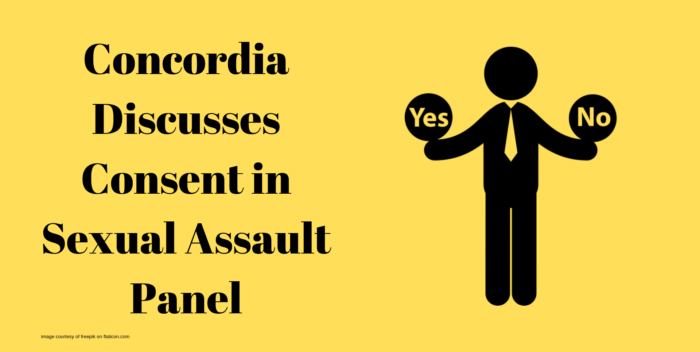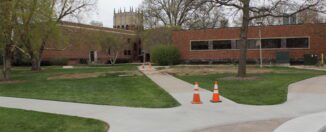Concordia Discusses Consent in Sexual Assault Panel
by Daniel Heitshusen
Concordia recently hosted a panel on sexual assault to address the importance of consent and the experiences of assault survivors.
The panel discussion was hosted in Thom Auditorium on April 10. It was led by Campus Nurse Andreea Baker and consisted of Cari Emerson, a victim advocate for Hope Crisis Center; Dr. Sue Gabriel, a professor at Nebraska Wesleyan University and Sexual Assault Nurse Examiner, Dr; Seward County Attorney Wendy Elston; and Campus Pastor Rev. Ryan Matthias.
The panel discussed a variety of topics, including the legal definition of sexual assault, the legal process and importance of reporting an assault, consent, alcohol, common emotional and mental effects and reactions to assault, how to support friends and/or family who have been sexually assaulted, and some ways to stay protected.
“A lot of victims, I would say a high percentage, like in the 90s, will have some kind of PTSD (post-traumatic stress disorder) from the assault, and from that stems anxiety, constant fear and withdrawal,” Emerson said.
Gabriel said there are many reactions people can have to being sexually assaulted, which are part of the post-traumatic stress they go through.
“Some of them are non-verbal, they just can’t say the words of what happened to them,” Gabriel said. “Some of them are laughing, some are crying, some are angry, and we see the whole spectrum of emotions within that short period, which is very normal.”
Elston explained that the lack of consent is an important aspect within the legal perspective of sexual assault.
“It has to be a lack of consent, by words or conduct, but you have to at least be able to portray reasonably that you are not consenting to having the sexual interaction with somebody,” Elston said.
Emerson pointed out that consent can also be withdrawn.
“You can give consent, but you can also take it away at any time,” Emerson said.
In cases where a friend or family member has been sexually assaulted, Matthias says that one of the best things you can do is listen and get a licensed counselor involved.
“Understand your limitations,” Matthias said. “It is good to listen (to them), but also refer (to a counselor).”
Matthias also talked from a Biblical standpoint, saying that his goal is to bring the hope of Jesus to the victim and to let them know that they are not alone but are truly loved by Him.
Some precautions that the panelists discussed include being aware of your surroundings, being cautious of dating websites, watching your drink if you are at a party, and taking a self-defense course.
If you or a loved one has been sexually assaulted, each of the panelists is a resource or a part of an organization that can help. All the resources below can help point you in the right direction if you do not know where to start:
Hope Crisis Center: 1-877-388-HOPE (4673); www.hopecrisiscenter.org.
On-campus Resources:
Counseling Services: counselingoffice@cune.edu
Campus Pastor: ryan.matthias@cune.edu
Campus Nurse: Andreea.baker@cune.edu













